The month of March gave south Florida its coldest temperatures of the year, dipping into the high thirties (~3 degrees Celcius) with one of our several cold (or should I say "cool?") fronts. Rain threatened with their approach but precipitation was sparse...
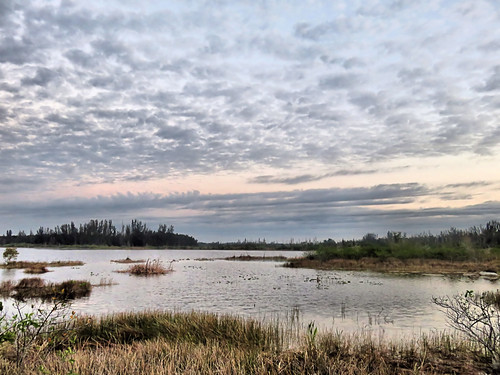
...and clear skies followed for several days after the passage of each front:
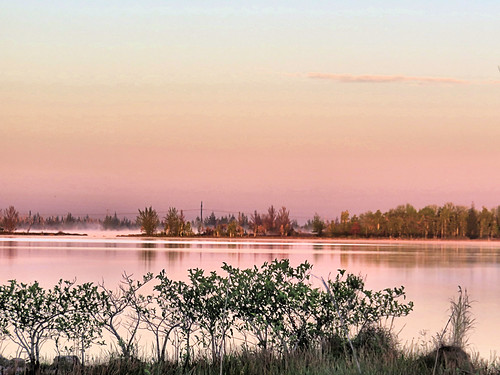
As a teenager working towards a Boy Scout merit badge I started keeping daily logs of bird sightings. I still have my old records, and I enjoy re-living some of the sightings.
The habit of carrying a pencil and a pocket-sized spiral notebook did not persist for very long, and even the notes I made about first or unusual bird sightings became more and more sketchy, finally deteriorating to date, name of bird and place-- the latter sometimes ambiguous.
I assumed I would always remember the exact location of "Charlie's Woods," "up at Camp" and "down the river," but now they do not exist. These are the entries for my first ten weeks of birding (Don't the rubber-stamped dates lend an air of authenticity?):
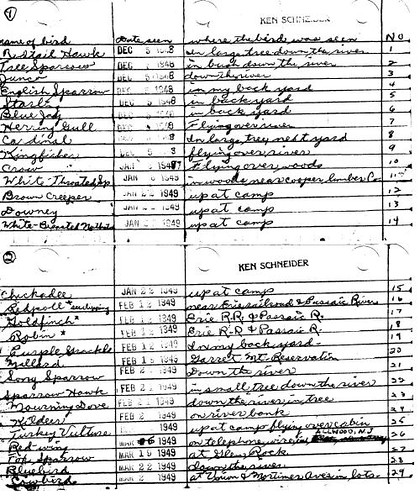
Stopping to take notes interfered with the joy of birding, and diverted my attention away from the sky and surroundings, possibly depriving me of exciting sightings.
Fast forward to the electronic revolution and the age of eBird. After moving to Florida I readily adapted to using this Cornell University Laboratory of Ornithology iPhone application to report my sightings. Yet there remained a certain nuisance factor, as I still had to stop and occupy both hands to punch in and update sightings.
After all, with snakes and fire ants to contend with, I was already looking down half the time just to walk from place to place. Then I found out that I could use the iPhone speech recognition feature. The eBird filter should be set to species expected locally. This will limit the matches to a single species or a select few.
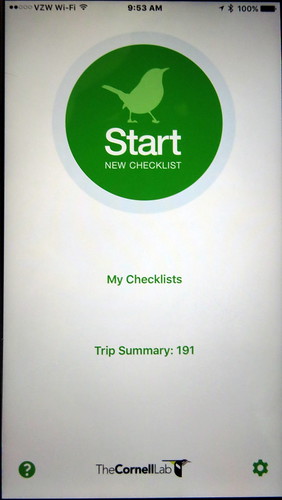
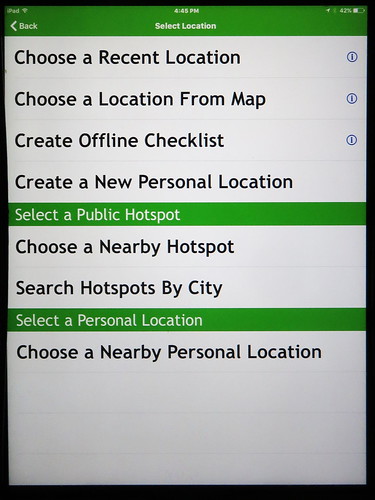
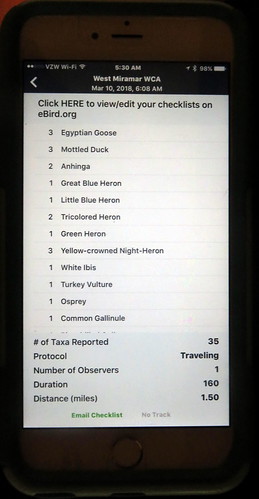
Talking to the eBird app requires one to adopt a spartan language style. Use as few syllables as necessary. Speak distinctly, sounding every consonant. If you don't, your "Osprey" becomes "odd spray." Better to say "OHspray."
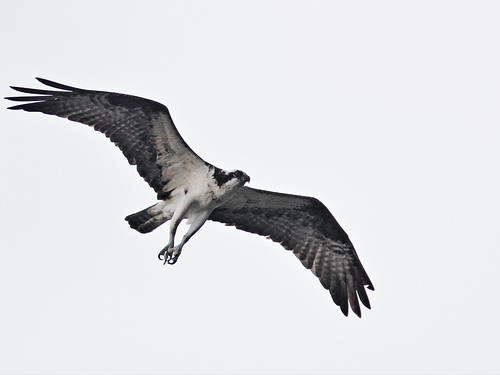
Say "Mottled Duck" too fast and it comes out "Matilda," or fail to pronounce the "TT" results in "modeled," neither of which matches a species in the eBird database. Ths Mottled Duck is in the company of a Black-necked Stilt (for which "black, hyphen, neck" will suffice for eBird):
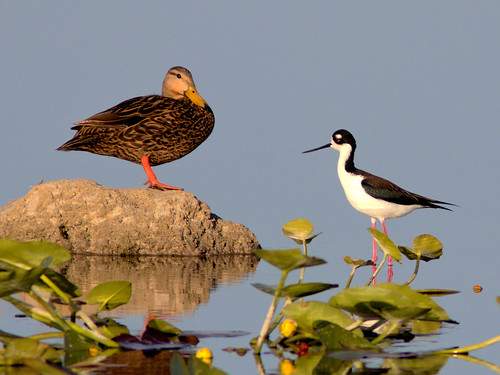
A White Ibis must be called a "hWyte ibis" lest it become "what I best."
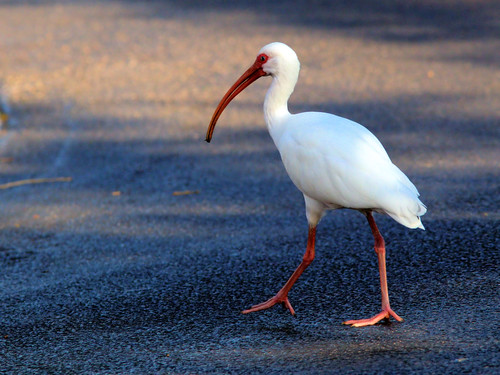
Never use plurals, as they will be translated to possessives such as dove's and sparrow's. Goose matches many species while geese does not. Keep it short and simple. "Egyptian" is all you need to say to call up the Egyptian Goose:

"European" is enough to auto-complete the Starling...
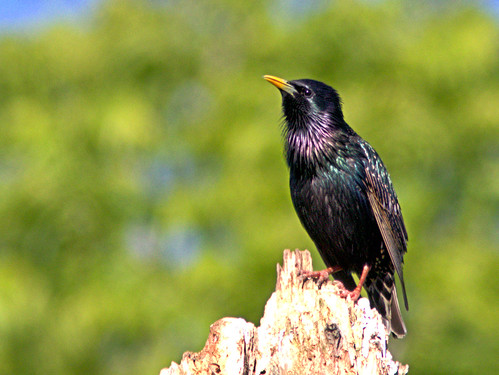
...and "Loggerhead" matches the only bird in our local list. The local filter produces the Shrike but ignores the rare Loggerhead Kingbird (and Turtle):
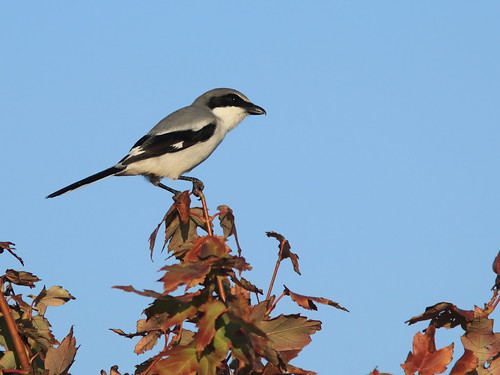
There is no such bird as a bluejay, so say "Blue, Jay:"
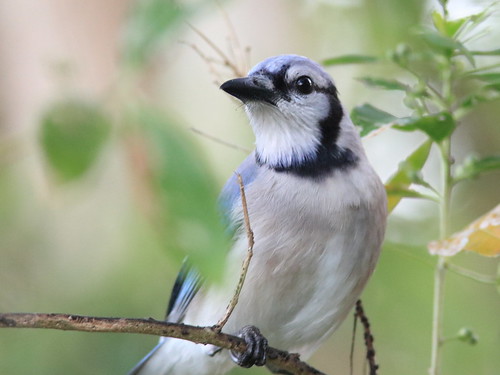
Make sure the syllables are run together where appropriate, so that your "kingfisher" does not summon an unrecognized "King Fisher." Only the Belted Kingfisher is selected in south Florida, while you may need to choose from a list of kingfishers in south Texas or Latin America:
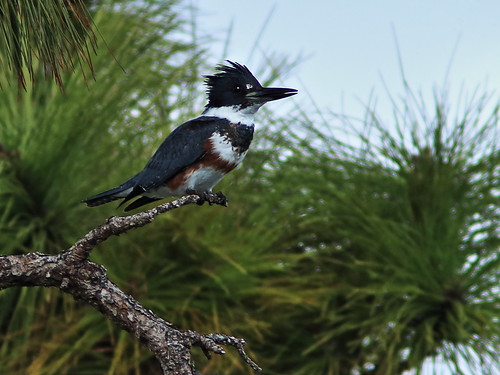
Say "hyphen" when there is one in a bird's name -- it's a "red, hyphen, bell" if you want to report a Red-bellied Woodpecker in Florida (the filter in the western US would turn up a sapsucker!):
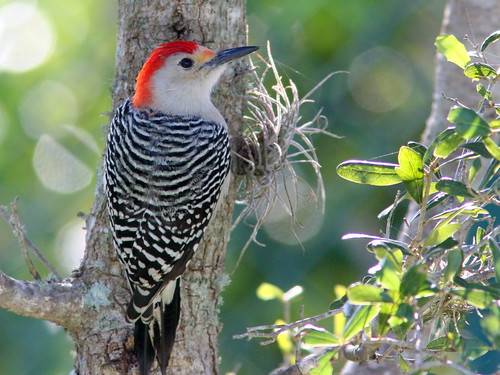
Truncating the names actually improves accuracy. For example, "boat, hyphen, tail" is enough for Boat-tailed Grackle:
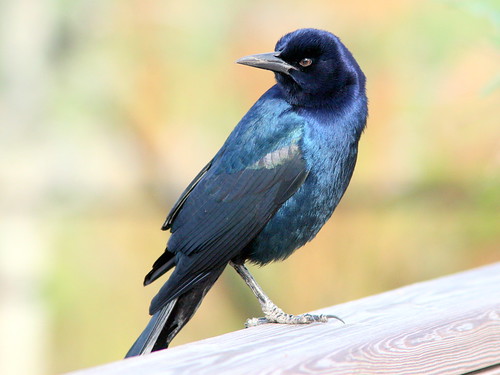
"Tricolored" will match the Heron by that first name, if you do not improperly add a hyphen:

Don't worry if "Mourning Dove" comes out "Morning Dove," as eBird will automatically spell-check it and enter it properly:
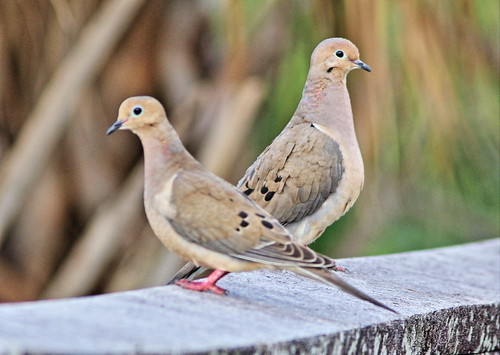
The eBird app's artificial intelligence (AI) also automatically drops the "e" in "Downey" Woodpecker:
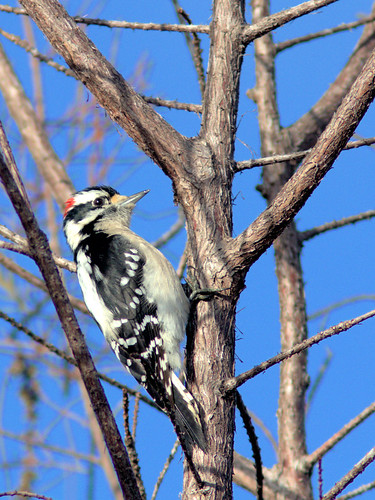
However, eBird seems to ignore a British flair, and refuses to match your Gray Catbird, which Apple's AI insists on spelling as "grey," so simply say "catbird," (but not "cat, bird") to enter it correctly:
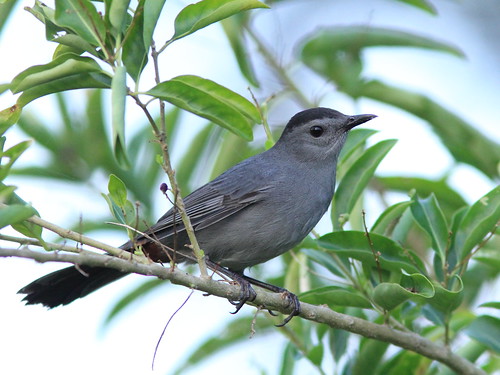
Similarly, to keep the Blue-gray Gnatcatcher from defaulting to unacceptable "grey," simply say "blue, hyphen, letter G."

The correct species will pop up if you leave off "Heron" and just say "Great, Blue"...
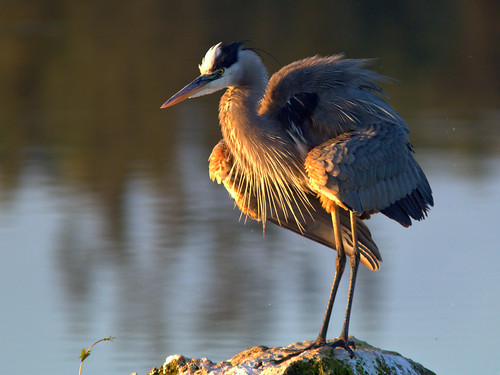
...or "Little, Blue:"
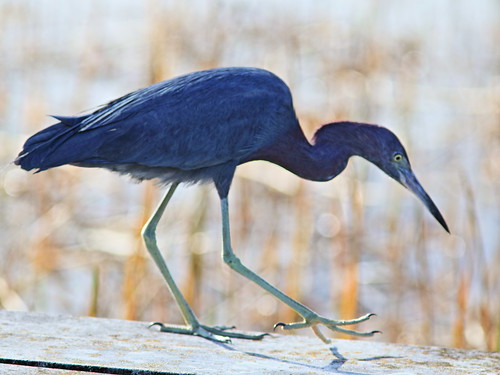
"Red hyphen shoulder" is enough for the Red-shouldered Hawk:

I could go on and on, but if you haven't used speech recognition with the eBird app, try it and you may like it! This feature also simplifies addition of species comments and other observations about weather and habitat.
Oh, and some bird names, notably "vireo" for me, will never be properly recognized, although "white hyphen letter E" will match with the White-eyed Vireo...

...and "red hyphen letter R" brings up the Red-eyed Vireo:

If all else fails, go back to punching in the full name or its four-letter banding code, but watch where you step!
= = = = = = = = = = = = = = =
Linking to Misty's CAMERA CRITTERS,
Linking to Eileen's SATURDAY'S CRITTERS,
Linking to SKYWATCH FRIDAY by Yogi, Sylvia and Sandy
Linking to WEEKEND REFLECTIONS by James
Linking to BirdD'Pot by Anni
Linking to Our World Tuesday by Lady Fi
Linking to Wild Bird Wednesday by Stewart
Linking to Wordless Wednesday (on Tuesday) by NC Sue
Linking to ALL SEASONS by Jesh
________________________________________________
Please visit the links to all these memes to see some excellent photos on display
________________________________________________
Here is a riddle to start your day:
(Q.) Which CRITTER has four legs and flies?
(A.) The classic answer is "a horse, of course!" (And we don't mean the mythical Pegasus)
If you answered that it was this male Julia heliconian butterfly as it prepares for a landing on a Lantana flower, you would have been wrong. Its proboscis is already extending in anticipation of the sweet taste of nectar, and its landing gear are down.
Count those legs-- four! But why is this the wrong answer? Stay tuned to find out.

Another answer might be pairs of two-legged creatures with wings. Maybe this is cheating because the riddle implies that it seeks the identity of a single creature. Anyway, here are a few couples who, arguably, meet the description. Can you distinguish the males from females?
Mottled Duck males tend to be bigger and have yellowish mostly clear bills:

Pileated Woodpecker males have a red forehead and mustache streak, but both are gray or black in females:

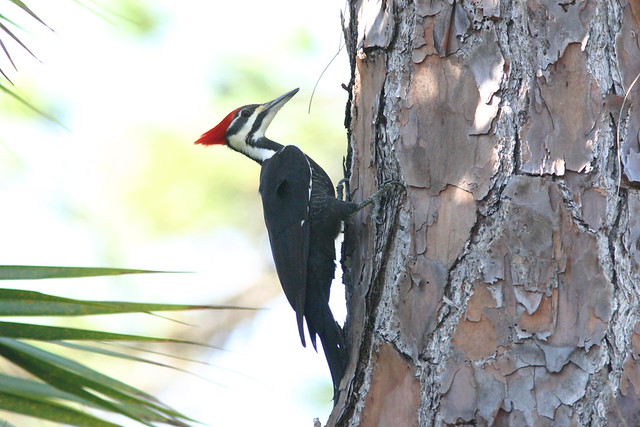
The red on the nape and head of male Red-bellied Woodpeckers extends all the way to the forehead, but the female's forecrown is light gray:
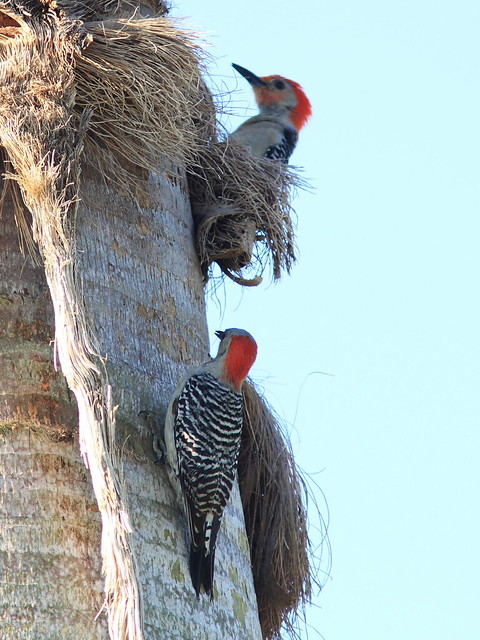
Least Tern sexes are similar and best determined by behavior. Males (in the foreground) usually seem to have a brighter yellow bill:
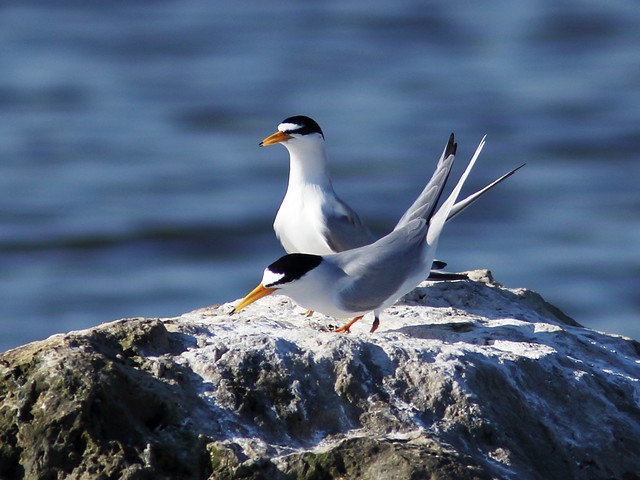
Bald Eagle males are noticeably smaller than females and their gape usually extends no more than halfway under the eye, while that of the female (in foreground) may reach past the center of the eye:

We happen to know that the male in this pair of Burrowing Owls looks as if he has a beard. He also seems to have a deeper "frown," but these are individual characteristics. Normally the female is darker during breeding season because the slightly larger male stands guard outside the burrow and his feathers are more exposed to the bleaching effect of sunlight:
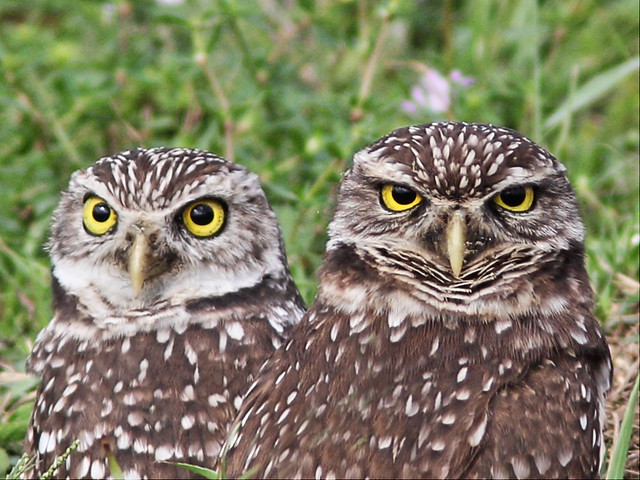
In these Mew Gulls it is anybody's guess as to which is the male. Both have brightest yellow bills during breeding season. This photo was taken in June, 2011 in Denali National Park, Alaska:
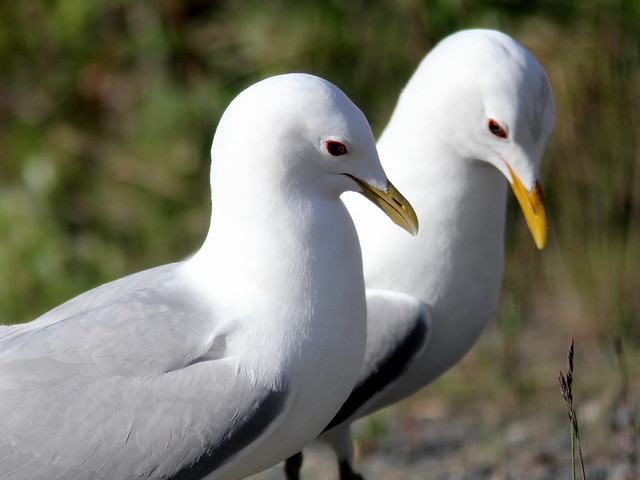
From their behavior, we know that the Killdeer on the left is the male. He repeatedly expanded the upper ring on his neck as a courtship gesture:
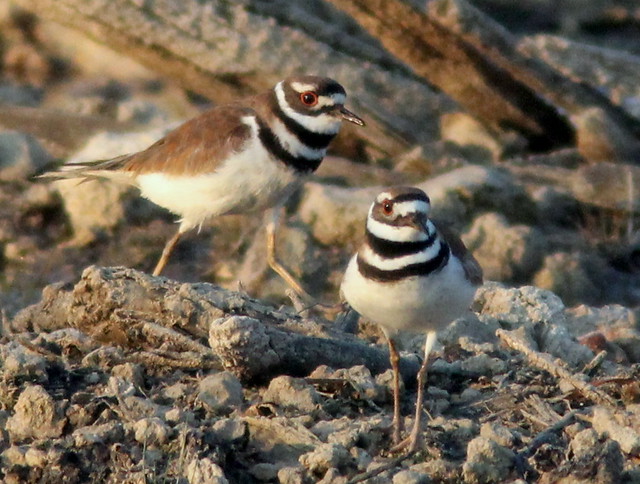
Mallards-- no problem finding the colorful drake here!:
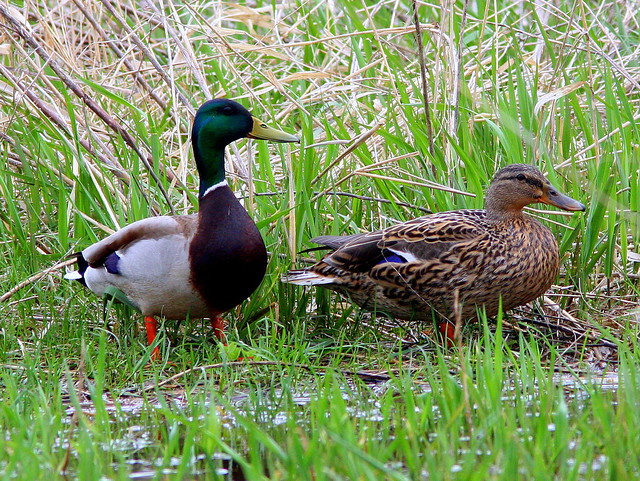
House Finches-- who wears the brightest coat?:

The sexes of Green Herons are very similar, but we think the one presently incubating the eggs is the male because its legs were bright red, not described as a reliable indicator. This pair is exchanging incubation duties:
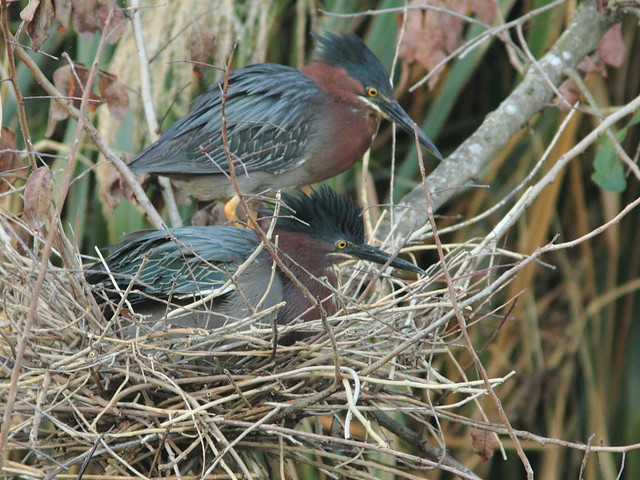
Male Yellow-crowned Night-Herons are said to be slightly larger than females, but this is a toss-up:
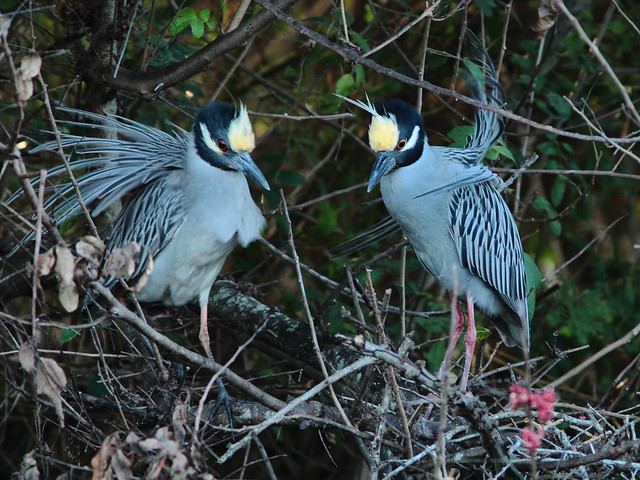
The male Mourning Dove on a FENCE is all puffed up:
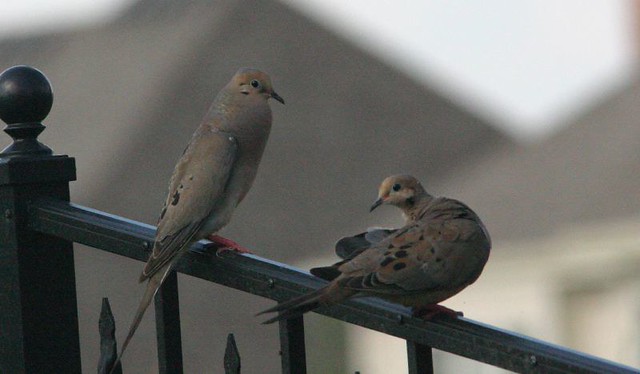
These Purple Swamphens share four legs (not counting those in the REFLECTION) but sexes are similar:
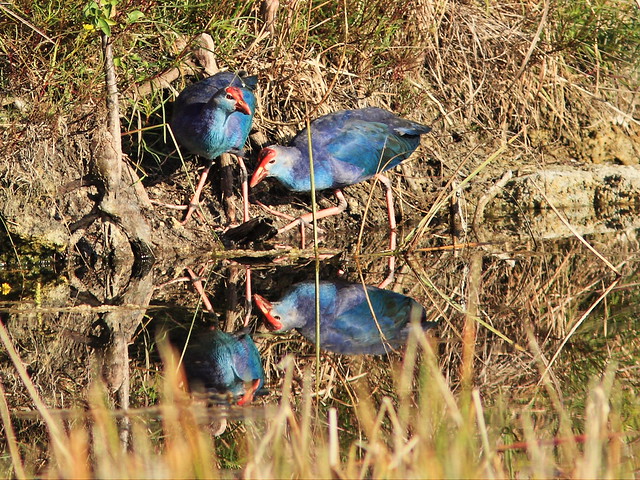
To be concise, the riddle should have asked: "What has six legs, two wings but only four feet?" That might have been a real puzzler, keeping you on the edge of your seat to hear the answer. The Julia heloconian indeed fits this description.
Top MACRO view, male Julia:
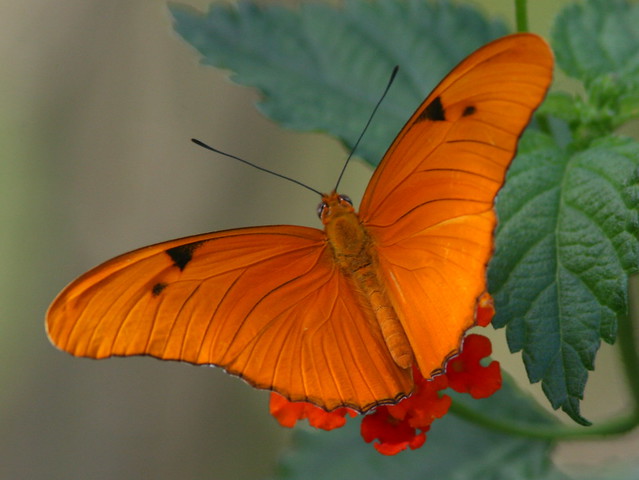
Top view, female Julia:
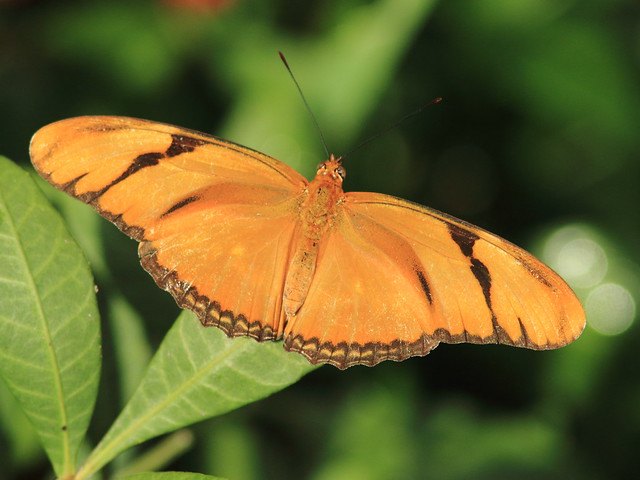
Side view, male also shows four legs...
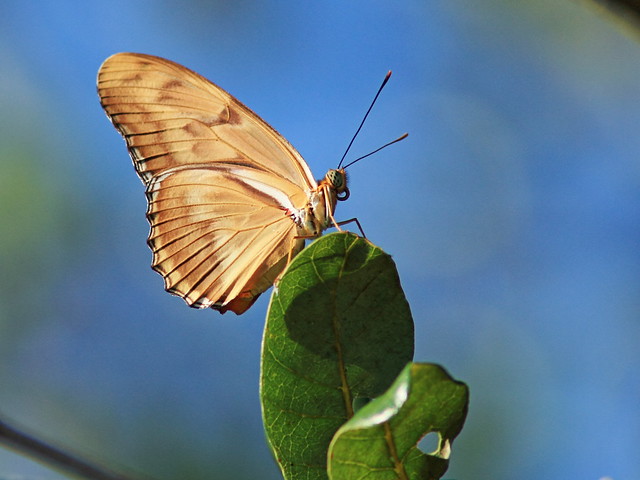
As does this side view of a female:
 The Julia belongs to the group of brush-footed butterflies or four-legged butterflies. Many species are brightly colored but their under-wings are often dull and may look like dead leaves, as in the case of this species.
The Julia belongs to the group of brush-footed butterflies or four-legged butterflies. Many species are brightly colored but their under-wings are often dull and may look like dead leaves, as in the case of this species.
In adults, the first pair of legs are much shorter than the other four legs, and are not used for walking. The front legs do not have feet, just little brushes of hairs that are used for smelling and tasting. Like parts of their mouth,they can be so small as to be practically invisible.
Rain Clouds moved into the SKY over the lake a little after sunrise:
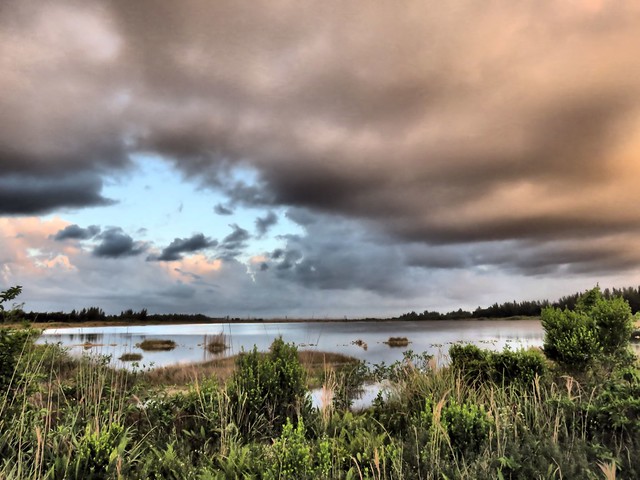
A bonus photo-- we have just returned from a rail trip in Canada. This is the view of Lake Louise in Banff National Park, Alberta. It is taken from the window of our room in the Fairmont Chalet. The sun is breaking through the clouds. The Upper Victoria Glacier is visible in the background. The Lower glacier extended well into the lake in the early part of the 20th Century, but now has retreated up and to the right of the mountain.

As the lake is fed by outflow of the glaciers, it takes on an emerald color, due to the suspended "glacier dust" or "rock flour" which is scoured from the limestone as the ice moves down. Depending upon sky conditions, the water may appear any color from gray to deep blue or green.
Looking back three years in anticipation of what may turn up again this month. My potpourri gathered from the archives features images that I hoped would match the themes of critters, fences, skies and reflections. It took me until May 25 to fill in all the blanks.
CRITTERS:
The month started off and finished with me in Illinois, where I captured this brightly colored eastern subspecies of Palm Warbler (Batavia, IL, May 1, 2012):
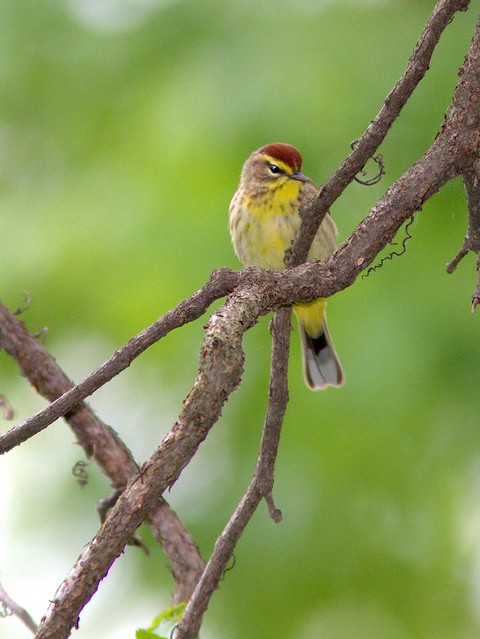
A Wild Turkey crossed the path in front of us (May 1, 2012, Batavia IL):

The next day a Savannah Sparrow posed atop a rock in our North Aurora, IL yard (which, sadly, has now been developed into acres of town-homes):
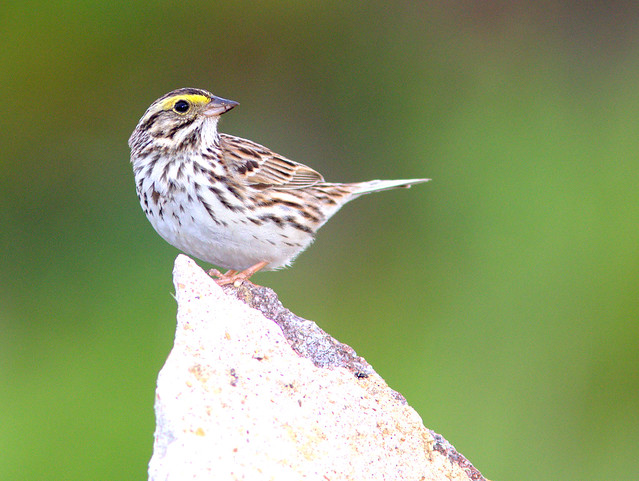
On May 3 a Rose-breasted Grosbeak brightened our morning (Batavia, IL):

What is prettier than the sight of an American Goldfinch in morning light (North Aurora, IL)...

...unless it is the song of a Yellow Warbler? (May 11, Batavia IL)

The month is not half over and I am overwhelmed with color-- a Scarlet Tanager (May 13, 2012, Batavia, IL).
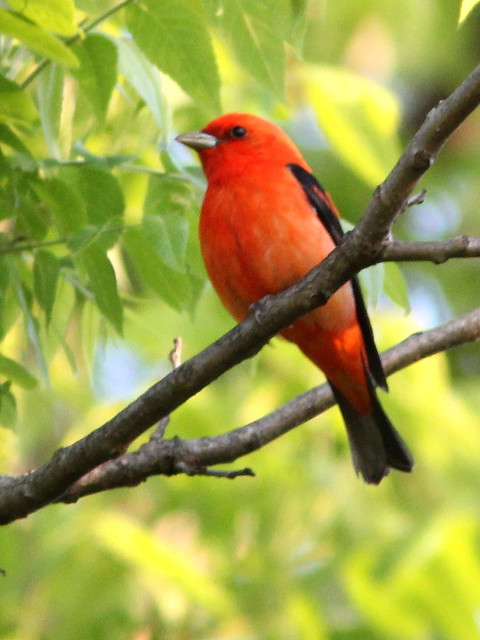
Yet, I cannot pass up this image of two fledgling Great Horned Owls, in Geneva, IL on May 23, 2012

Linking to Misty's CAMERA CRITTERS,
Linking to Eileen's SATURDAY'S CRITTERS,
________________________________________________
FENCE:
The first fence that showed up in this month's archives was occupied by a Chipping Sparrow in our daughter's back yard in Batavia, on May 9, 2012:

Linking to GOOD FENCES by Tex (Theresa).
________________________________________________
SKYWATCH:
I was hard-pressed to find a single "sky shot" in the May 2012 archives. In this shot the sky is partly obstructed by a Red-tailed hawk (Batavia, May 9, 2012)...
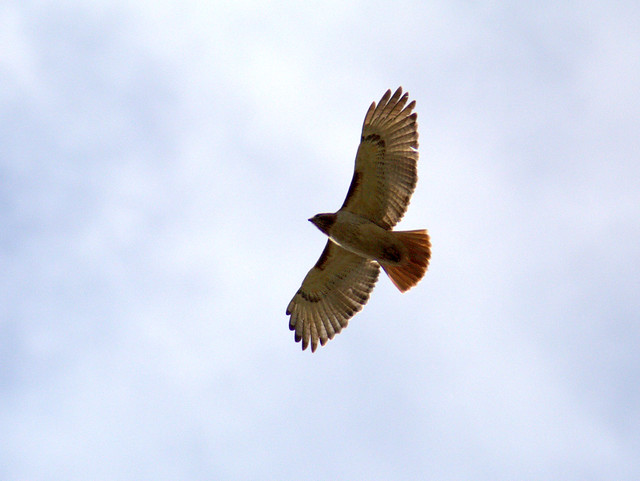
...and in this, the cloudless sky complements the coat of an Indigo Bunting (Batavia, May 11, 2012):

Linking to SKYWATCH FRIDAY by Yogi, Sylvia and Sandy
________________________________________________
REFLECTION:
A family of Mallards on the placid water of the Fox River, Aurora, Illinois, May 25, 2012:
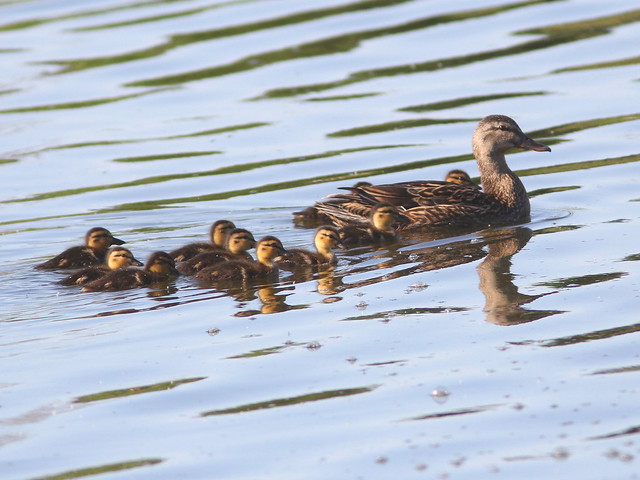
Linking to WEEKEND REFLECTIONS by James
________________________________________________
Also:
Linking to BirdD'Pot by Anni
Linking to Wild Bird Wednesday by Stewart
_______________________________________________
Please visit the links to all these memes to see some excellent photos on display



























































